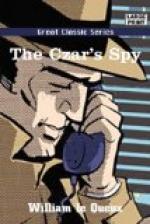Stirred by the complete mystery which now seemed to enshroud the unfortunate girl, I set before myself the task of elucidating it. Hitherto I had remained passive rather than active, but I now realized by that curious letter that at least one woman’s life was at stake—that Elma Heath was in possession of some secret.
On leaving Leghorn I had given up all hope of tracing the mysterious yachtsman, and had left the matter in the hands of the Italian police. But, without any effort on my own part, I seemed to have been drawn into a veritable network of strange incidents, all of which combined to form the most complete and remarkable enigma ever presented in life. Surely no man was ever confronted by so many mysteries at one time as I was at this moment.
Fortunately I had been careful not to show my hand to anyone, and this perhaps gave me a distinct advantage. On my journey back to London, as the train swung through Peterborough and out across the rich level lands towards Hitchin, I recollected Jack Durnford’s words when I had mentioned the Lola. What, I wondered, did he know?
Next month, in November, he was due back in London after his three years’ service on the Mediterranean station. Then we should meet in a few weeks I hoped. Would he tell me anything when he became aware of all I knew? He held some secret knowledge. Was it possible that his secret was the same as that held by the unfortunate girl in far-off, dreary Finland?
I called at the house in Cork Street indicated by Elma, and learned from the old commissionaire who acted as lift-man and porter, that Mr. Woodroffe’s chambers were closed.
“’E’s nearly always away, sir—abroad, I think,” was all I could get out of the old soldier, who, like his class, was no doubt well paid to keep his mouth closed.
For two days I lounged about Westbourne Grove watching Ferrari’s restaurant. In such a busy, bustling thoroughfare, with so many shop windows as excuses for loitering, the task was easy. I saw that Olinto came regularly at ten o’clock in the morning, worked hard all day, and left at nine o’clock at night, taking an omnibus home from Royal Oak. His exterior was calm and unconcerned, unlike that of a man whose devoted wife had disappeared.
I would have approached him and explained the ghastly truth, had it not been for the fact that the poor woman’s body was missing.
Those September days were full of anxiety for me. Alone and unaided I was trying to solve one of the greatest of problems, plunged as I was in a veritable sea of mystery. I wanted to see Muriel Leithcourt, and to question her further regarding Elma Heath. Therefore again I left Euston, and, traveling through the night, took my seat at the breakfast-table at Greenlaw next morning.
Sir George, who was sitting alone—it not being my aunt’s habit to appear early—welcomed me, and then in his bluff manner sniffed and exclaimed:




